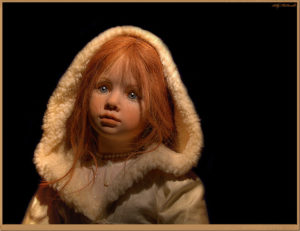
I was sorting British currency at one of earth’s busiest airports when my two-year-old girl vanished.
Amy had stood quietly at my side seconds ago as I made a kiosk purchase. In a quick, awkward 360 degree swirl I scanned what I could of this piece of Heathrow’s bustling throng. Amy! My little girl was no where in sight.
We had flown here from Nairobi, Kenya. Our family’s connecting flight to the U.S. would receive passengers in a couple hours. I sprinted the short distance to my wife, Ann, and the two older children. Because of a fractured toe from the day before, Ann could only stay seated, her leg out before her with the bandaged foot resting atop a lower piece of luggage.
“Julie! Scott!” They jumped to action when told their little sister had disappeared – striking off in directions indicated by my commando-like hand signals. I took in the many and varied images of travelers, their luggage pieces trailing behind like obedient pets. Nationalities and languages from all parts. My eyebrows furrowed. Some 75 million travelers pass through London’s Heathrow yearly. Lord. Where? Where can she be? Help us, Lord.
My movements were a vigorous, graceless waltz, craning this way and that, continuously turning, specially scoping for signs of ‘little people’.
Seconds felt like minutes, minutes like hours.
In something over five minutes the airport’s public address system gave a pop, then hummed to life. The voice was male.
It was even. Strong. Indisputably English. Voices have a way of projecting personality. The person back of this voice was clearly gentle and good-humored.
“Heathrow travelers, I would like your attention, please.” The din of luggage casters clacking and shoes clicking and people clamoring only barely faded as the announcer went on. “Ladies and gentlemen, it seems we have a young lady, an Amy-BethLout (he blended the middle and last names to sound as one, sparing himself the awkwardness perhaps of associating the unflattering term ‘lout’ with any of his esteemed airport guests.) Regardless, the gentle, good-humored security fellow had got my attention. “Thank you, Lord”, I breathed.
It seems Amy had become sort of spellbound, taking in the grand throng of men and women and children. And their pigmentation. Since her East Africa birth only a tiny fraction of people she had seen had a skin color common to her own. Absentmindedly, after a mere few steps, she had drifted into the river of humanity.
Now I was holding her in a close hug.
”So Amy, tell us, how did you get to the nice man with the microphone?”
“Well,” she swayed back and forth slightly, “after awhile I looked around and I couldn’t see you anymore.” An old man with probably his wife was near to me. So I reached up and pulled down on his jacket. He looked at me and I said, “Do you know my daddy?” And so they got me back to you.
Her smile was unlabored, spontaneous, wonderfully naïve. “I’m glad we found each other daddy.”
I smiled back, only now aware my heart rate had begun normalizing again.
“I am too, Amy.” I hugged her again. “Really glad.”

©2017 Jerry Lout



